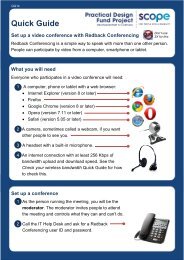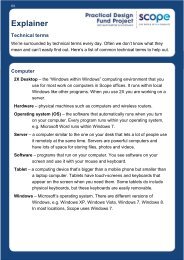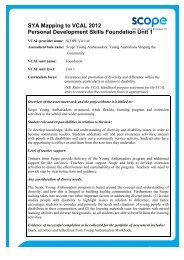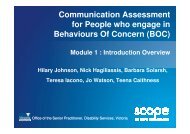Positive behaviour support Getting it right from the start
Positive behaviour support Getting it right from the start
Positive behaviour support Getting it right from the start
You also want an ePaper? Increase the reach of your titles
YUMPU automatically turns print PDFs into web optimized ePapers that Google loves.
<strong>Pos<strong>it</strong>ive</strong> <strong>behaviour</strong> <strong>support</strong>: <strong>Getting</strong> <strong>it</strong> <strong>right</strong> <strong>from</strong> <strong>the</strong> <strong>start</strong> - Facil<strong>it</strong>ators reference manual 19<br />
PowerPoint 28<br />
*<br />
Perceptions<br />
Perception<br />
‘… a way of seeing or understanding things ’<br />
PowerPoint 29<br />
*<br />
1. We all see <strong>the</strong> world differently:<br />
because of our education, socialisation, upbringing, different experiences, class, background<br />
and so on.<br />
2. Our perceptions are a result of a complex interaction of internal and external factors:<br />
how we feel at <strong>the</strong> time, <strong>the</strong> s<strong>it</strong>uation we are in, our socialisation experiences, and interactions<br />
w<strong>it</strong>h o<strong>the</strong>rs (for example, if I am feeling negative <strong>the</strong>re is nothing my partner can do <strong>right</strong>).<br />
3. We generally accept our perceptions and <strong>the</strong> interpretations we make based on <strong>the</strong>m,<br />
as a true representation of real<strong>it</strong>y:<br />
everything in our past and about us tells us that what we see and know is correct. This is how<br />
we make sense of <strong>the</strong> world categorising and matching w<strong>it</strong>h our memories of our experiences.<br />
This can be a problem when we come up against o<strong>the</strong>r individuals who believe <strong>the</strong>y also have a<br />
true representation of real<strong>it</strong>y.<br />
How to check perceptions of <strong>behaviour</strong>s<br />
• Involve <strong>the</strong> person, <strong>support</strong> professionals, parents and advocates in deciding whe<strong>the</strong>r a<br />
<strong>behaviour</strong> is a problem.<br />
• Be consistent w<strong>it</strong>h what is generally considered as normal for living s<strong>it</strong>uations, for example,<br />
think of living w<strong>it</strong>h five people, think of <strong>the</strong> people living w<strong>it</strong>h you and <strong>the</strong> confrontations you<br />
have in daily living,<br />
Don’t deny <strong>the</strong> real<strong>it</strong>y of shared living. S<strong>it</strong>uations where people live toge<strong>the</strong>r are characterised<br />
by frequent difficulties and disagreements and occasional periods of stress. These dimensions<br />
are part of normal daily life and as natural for people w<strong>it</strong>h disabil<strong>it</strong>ies living toge<strong>the</strong>r as <strong>the</strong>y are<br />
for o<strong>the</strong>rs.<br />
• Whatever <strong>the</strong> reason, <strong>the</strong> efforts of <strong>support</strong> professionals to provide people w<strong>it</strong>h tranquil<br />
lives by eliminating all conflict are not only unreasonable, but <strong>the</strong>y can be perceived and<br />
experienced by <strong>support</strong> professionals as oppressive.<br />
• Be flexible and open to different perspectives.<br />
• Continually change your own motives and methods in <strong>support</strong>ing people who show<br />
<strong>behaviour</strong>s of concern.<br />
• As <strong>support</strong> professionals, we have an unusual degree of power in that we can easily, in<br />
our pos<strong>it</strong>ion, curb <strong>behaviour</strong> which does not personally f<strong>it</strong> in w<strong>it</strong>h our values. We should<br />
be conscious of this when interacting w<strong>it</strong>h clients and be conscious of our <strong>behaviour</strong>,<br />
such as body language, tone of voice and expectations.

















